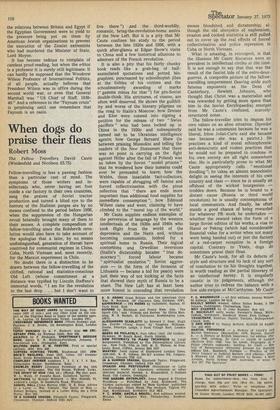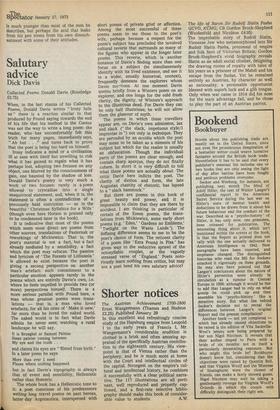When dogs do praise their fleas
Robert Moss
The Fellow Travellers David Caute (Weidenfeld and Nicolson £5.75) Fellow-travelling is less a passing fashion than a particular cast of mind. The symptoms of those writers and intellectuals who, never having set foot inside a car factory in their own countries, sang the praises of Soviet tractor production and turned a blind eye to the horrors of the Stalinist purges are by no means confined to the period before 1956, when the suppression of the Hungarian revolt belatedly brought many of them to their senses. A complete compendium of fellow-travelling since the Bolshevik revolution would also have to take account of the apologias that a later, by no means undistinguished, generation of literati have contrived for communist regimes in China, Cuba, North Vietnam and, most recently, for the Marxist experiment in Chile.
No doubt there is a distinction to be drawn between the fellow-travelling of the citified, rational and statistics-conscious Old Left (whose commitment at a distance was typified by Lincoln Steffens's immortal words, "1 am for the revolution to the last drop . . . but I don't want to live there ") ,and the third-worldly, romantic, bring-the-revolution-home antics of the New Left. But it is a pity that Mr Caute confines his study to the period between the late 1920s and 1956, with a quick after-glance at Edgar Snow's visits to China and a few historical allusions to admirers of the French revolution.
It is also a pity that his fairly chunky book reads like a grab-bag of half assimilated quotations and potted bio graphies, punctuated by schoolboyish jibes at the foibles of his victims and the schoolmasterly awarding of marks (" gamma minus for that ") for pro-Soviet double-think. His strictures, of course, are often well deserved. He shows the gullibil ity and worse of the literary pilgrims on the road to Stalin's Moscow: how Dreiser and Klee were conned into signing a petition for the release of two "Swiss pacifists" who had been locked up in China in the 1920s and subsequently turned out to be Ukrainian intelligence agents; how George Bernard Shaw (in between praising Mussolini and telling the readers of the New Statesman that there was no point in carrying on the fight against Hitler after the fall of Poland) was so taken by the Soviet "model prisons" that he wondered how their inmates could ever be persuaded to leave; how the Webbs, those insatiable fact-collectors, were capable of shrugging off famine and forced collectivisation with the pious reflection that "there are ends more important than additional food supplies for immediate consumption "; how Edmund Wilson came and went, claiming to have climbed to the "moral top of the world."
Mr Caute supplies endless examples of the perversion of language by the western intellectuals of the 1930s and 1940s who took flight from the world of the depression and the Nazis and, without becoming communists, looked for a spiritual home in Russia. Their logical contortions and Orwellian inversions (Stalin's dictatorship became "true de mocracy "; forced labour became " spiritualist emulation "; Soviet aggression — in the form of the invasion of Lithuania — became a bid for peke) were just their way of not looking at the facts that showed their myth of Russia to be a sham. The New Left has at least been more honest in conceding that revolution means bloodshed and dictatorship; although the old sheepskin of euphemism, evasion and cooked statistics is still pulled out to cover up the real effects of forced collectivisation and police repression in Cuba or North Vietnam.
What is amazing, in retrospect, is that the illusions Mr Caute discusses were so prevalent in intellectual circles at the time.
It is not enough to say that that was the result of the fascist tide of the entre-deux guerres. A composite picture of the fellow travelling temperament (leaving aside such fatuous exponents as the Dean of Canterbury, Hewlett Johnson, who thought that Christ was a materialist and was rewarded by getting more space than him in the Soviet Encylopaedia) emerges from Mr Caute's confused, scarcelystructured notes.
The fellow-traveller tries to impose his own values on an alien situation. (Spender said he was a communist because he was a liberal, Irene Joliet-Curie said she became one because she was a patriot.) He practises a kind of moral schizophrenia: anti-democratic and violent practices that he would not be prepared to condone in his own society are all right somewhere else. He is particularly prone to what Mr Caute appropriately calls "emotional doodling "; he takes an almost masochistic delight in seeing the interests of his own country and class — since he is usually an offshoot of the wicked bourgeoisie — trodden down. Because he is bound to a distant cause (Russia or third world revolution) he is usually contemptuous of local communists. And finally, he often stands a good chance of being rewarded for whatever PR work he undertakes — whether the reward takes the form of a large Soviet edition of his works, a visa to Hanoi or Peking (which had considerable financial value for a writer when not many were being handed out) or just the flattery of a red-carpet reception in a foreign capital. Contrary to Yeats, dogs do sometimes praise their fleas. Mr Caute's book, for all its defects of style and structure and its lack of any sort of conclusion to tie his thoughts together, is worth reading as the partial itinerary of an intellectual heresy. It is singularly caustic in its judgements, although the author tries to redress the balance with a few side-swipes at McCarthyism. Mr Caute is much younger than most of the men he describes, but perhaps the acid that leaks from his pen stems from his own disenchantment with some of their attitudes.



































 Previous page
Previous page